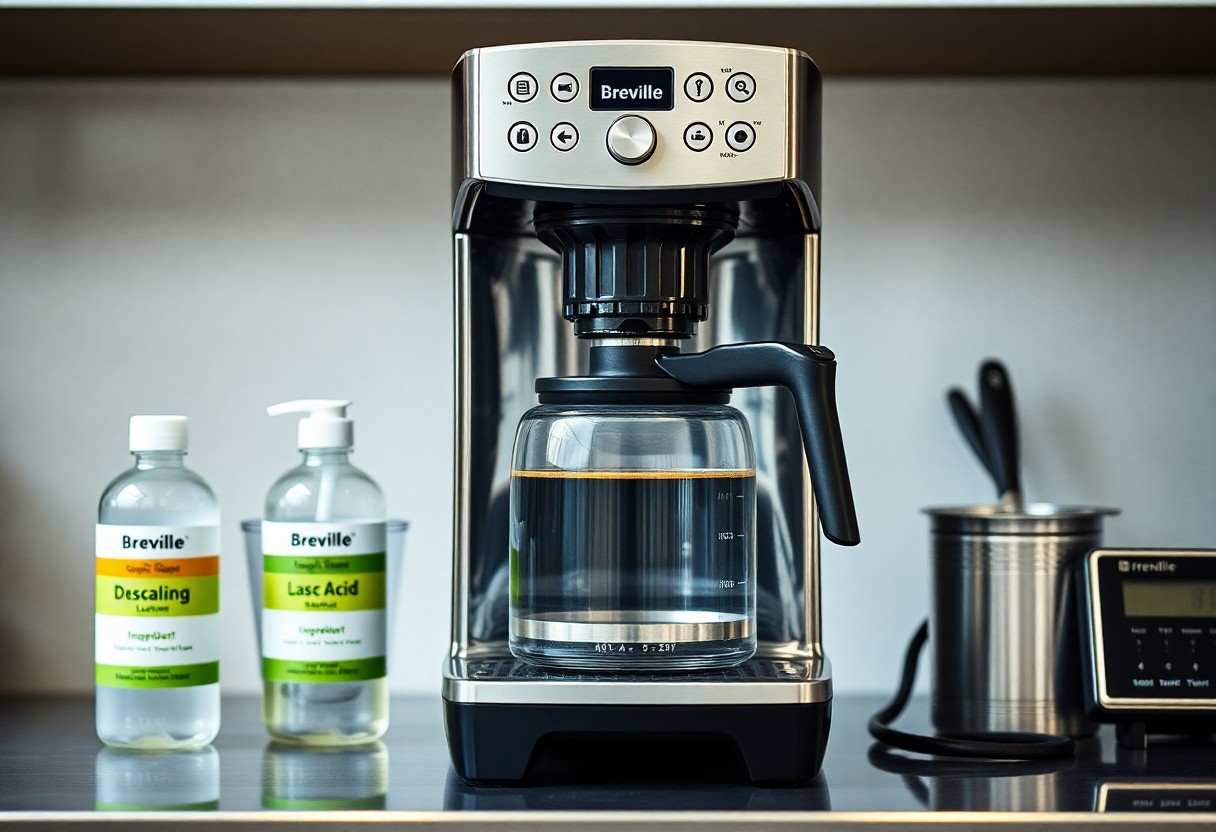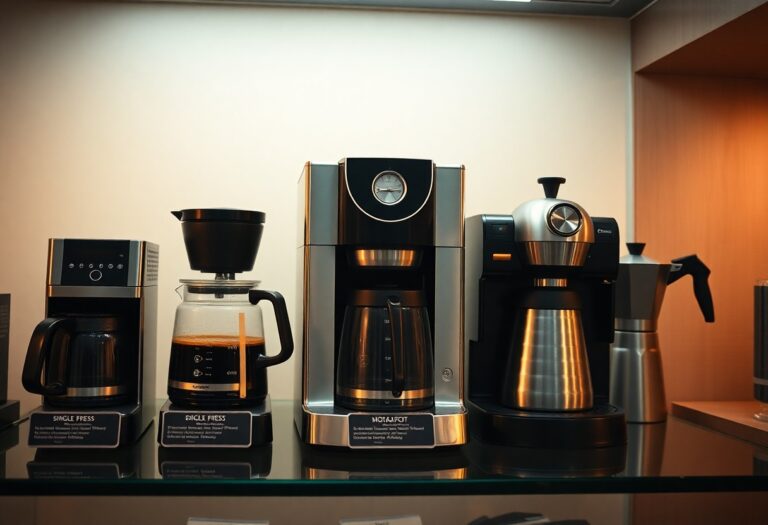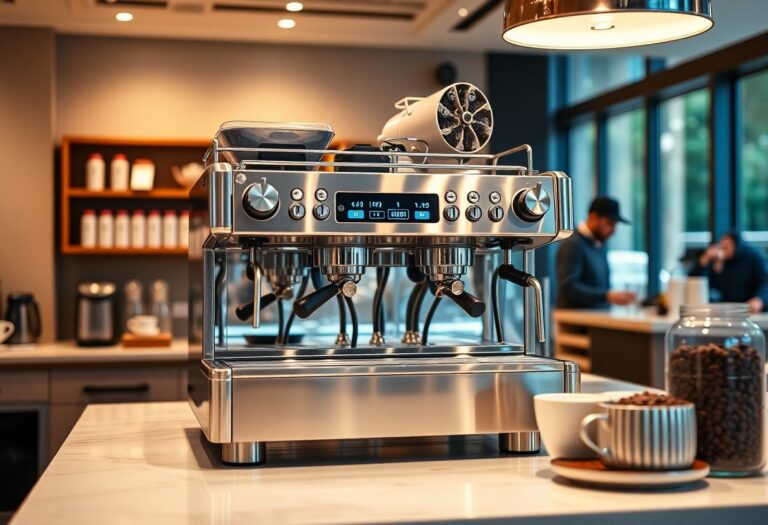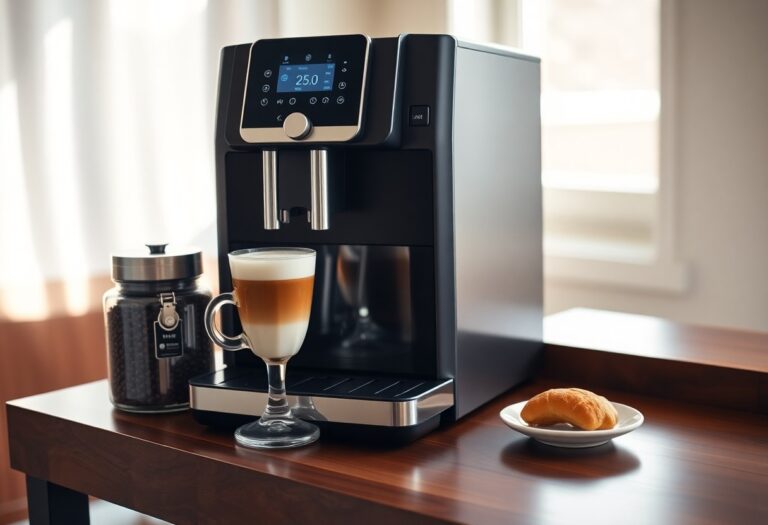What to Use to Descale Breville Coffee Machine – Brand Solutions
There’s a simple way to keep your Breville coffee machine in top condition, and that is through regular descaling. Over time, mineral buildup can negatively impact your machine’s performance, leading to poor coffee quality and potential damage. To combat this, you should use a reliable descaling solution. We recommend the Breville Compatible Descaling Solution. Specially designed for your machine, this product effectively removes limescale while maintaining the integrity of your coffee maker’s components. Taking these steps will enhance your brewing experience significantly.
Key Takeaways:
- Utilize a descaling solution specifically formulated for espresso machines to effectively remove mineral buildup.
- White vinegar can be used as a natural alternative, though it’s less effective than dedicated descalers.
- Follow the manufacturer’s instructions for the right concentration and the descaling process to avoid damage to the machine.
- Descale your Breville coffee machine every 2-3 months, or more frequently if you have hard water.
- Always flush the machine with clean water after descaling to ensure all residues are removed before brewing coffee again.
Identifying the Need for Descaling
Understanding when to descale your Breville coffee machine can significantly enhance its longevity and performance. Regular maintenance, including descaling, prevents mineral buildup that can compromise your brewing process. It’s crucial to stay attuned to the signs and be proactive in addressing them to ensure a consistently great cup of coffee.
Signs Your Breville Coffee Machine Needs Descaling
Your Breville coffee machine may be in need of descaling if you notice an extended brewing time, unusual noises during operation, or a decline in coffee flavor. Additionally, if you see white or brown build-up around the water reservoir or in the coffee spouts, it serves as a visual cue that mineral deposits are accumulating and should be addressed.
The Impact of Mineral Build-Up on Performance
Mineral build-up, primarily from hard water, can severely affect your coffee machine’s efficiency. Over time, these deposits can clog internal components, restricting water flow and leading to inconsistent extraction. This not only results in failed brews but can also damage sensitive parts of your machine, potentially leading to costly repairs.
In fact, studies have shown that consistent mineral build-up can reduce the lifespan of appliances by up to 30%. You may experience decreased water temperatures, resulting in under-extraction, which impacts the flavor profile of your coffee. By regularly descaling your Breville machine, you mitigate these risks, ensuring that each cup maintains its intended quality and that your investment remains protected.
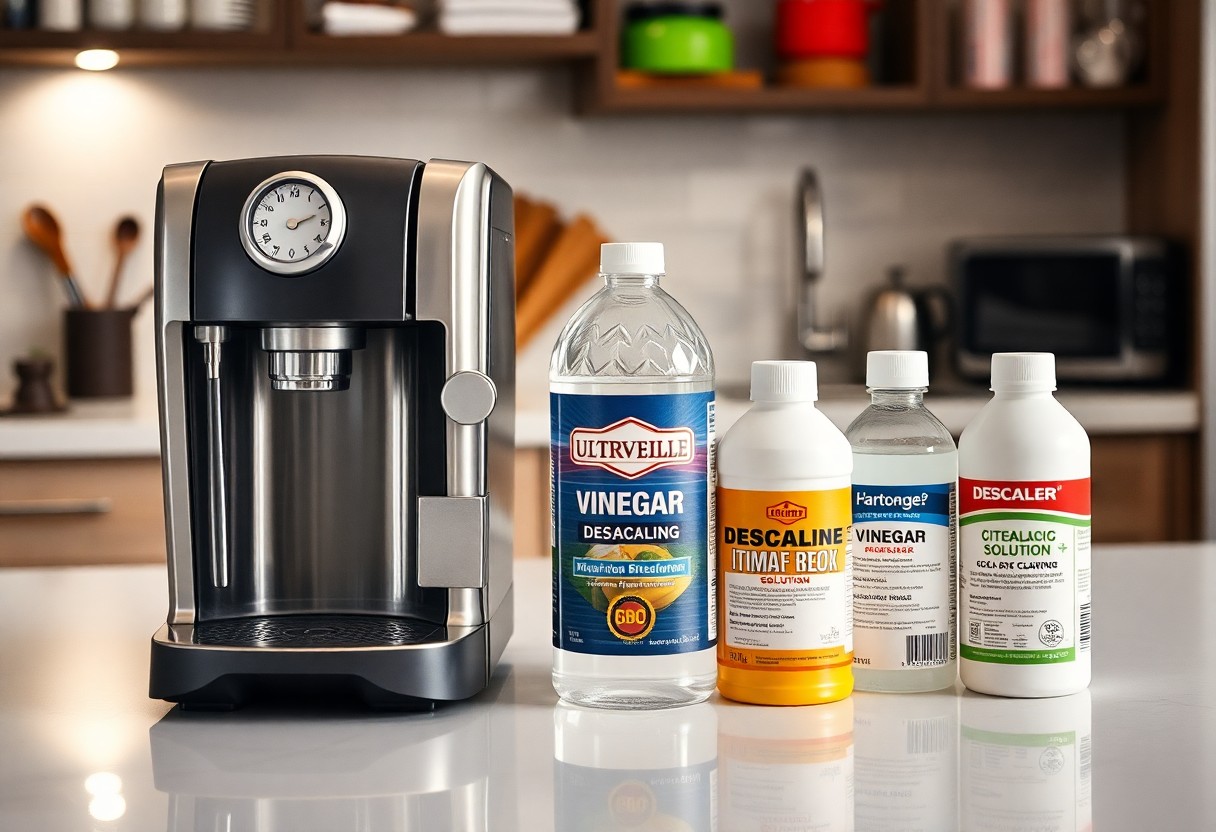
Choosing the Right Descaling Solution
Selecting the appropriate descaling solution for your Breville coffee machine is important to maintain optimal performance and flavor. You have several options, including commercial descalers specifically designed for espresso machines and more natural alternatives like vinegar. Each option has its advantages, so consider factors such as effectiveness, potential residue, and any manufacturer recommendations when making your choice.
Comparing Brand Solutions: Vinegar vs. Commercial Descalers
| Feature | Vinegar vs. Commercial Descalers |
|---|---|
| Effectiveness | Good for light mineral build-up |
| Speed | Slower dissolving action |
| Residue | May leave slight odor |
| Cost | Very inexpensive |
| pH Level | Acidic, but gentler on machine |
| Convenience | Widely available |
| Specificity | Not tailored for coffee machines |
| Long-term effects | Could minimize performance over time |
| Ease of Use | Straightforward |
| Manufacturer Recommendation | Not recommended by Breville |
The Pros and Cons of Breville’s Own Descaling Product
| Pros | Cons |
|---|---|
| Specifically formulated for Breville machines | Higher cost compared to DIY solutions |
| Effective in removing mineral build-up | Not widely available in all markets |
| No unpleasant odors after use | Requires specific usage instructions |
| Safe for internal components | May be seen as unnecessary by some users |
| Manufacturer supports its use | Requires regular purchase |
| Easy to use | Can lead to overuse if not monitored |
| Clear results after use | Not as environmentally friendly |
| Improves longevity of the machine | Could be considered unnecessary by DIY enthusiasts |
| Compatibility with various Breville models | Limited instructions for use with other brands |
| Help maintain warranty compliance | Potential for confusion about product during purchasing |
Breville’s own descaling product is engineered to cater to the specific needs of your machine, making it a reliable choice. It effectively removes scale with a formula designed to protect your coffee maker’s internal components, ensuring longevity and optimal performance. However, the higher price point may deter some users, especially when DIY solutions like vinegar are much cheaper. If you value ease of use, safety, and manufacturer backing, this product stands out as a premium option despite its drawbacks.
Step-by-Step Descaling Process
| Step | Description |
|---|---|
| 1 | Prepare your machine by emptying the water reservoir. |
| 2 | Fill the reservoir with descaling solution mixed with water. |
| 3 | Run the descaling cycle specific to your Breville model. |
| 4 | Rinse the reservoir and run a few cycles of clean water. |
Preparing Your Machine for Descaling
Before you begin the descaling process, ensure your machine is unplugged and cooled down. Remove any coffee grounds, empty the drip tray, and take out the water reservoir. Cleaning your machine can help prevent any residue from interfering with the descaling. Make sure you have a compatible descaling solution—Breville recommends its official descaler—but third-party options are also available. The key is to use a solution designed specifically for coffee machines to avoid damage.
The Detailed Descaling Procedure for Various Breville Models
Each Breville model features a unique descaling procedure tailored to its specific functionality. For instance, the Breville Barista Express requires a simple sequence of button presses to start the descaling cycle. In contrast, the Breville Bambino Plus has a more manual method. Check the user manual of your particular model for precise instructions, as there might be slightly different timings and process steps involved.
For example, the Barista Express engages the descaling mode by pressing the “1 Cup” and “Steam” buttons simultaneously. After your machine begins the cycle, the solution will flow through the system, effectively removing mineral buildup. The Bambino Plus requires you to fill the water reservoir with the descaler solution, then run hot water through the steam wand until it’s fully cycled. Following these specific procedures ensures optimal performance and longevity for your coffee machine.
Maintenance Tips for Optimal Longevity
To ensure the optimal longevity of your Breville coffee machine, it’s imperative to adhere to specific maintenance practices that keep your equipment in top condition. Regular cleaning and timely descaling will prevent the buildup of deposits that can affect performance.
- Wipe down the exterior with a gentle cleaner.
- Run clean water through the system after heavy use.
- Regularly check and replace water filters to avoid impurities.
- Utilize strong descaling solutions as recommended.
Perceiving these maintenance practices as part of your coffee-making routine will ensure a consistently enjoyable brew every time.
Preventative Practices to Reduce Scaling
Resourceful usage of your Breville coffee machine can significantly reduce scaling. Start by using filtered water for brewing, as minerals in tap water contribute to scaling. Regularly clean filters and brew baskets to maintain flow and efficiency. Your routine can also include brewing a lighter coffee occasionally, which reduces the residue buildup in the system.
Recommended Regular Maintenance Schedule
Establishing a maintenance schedule tailored to your coffee machine’s usage can further enhance its lifespan. For instance, descaling every one to three months works well for frequent users, while lighter users may schedule it every six months. Regularly replace water filters every two months to ensure your coffee remains fresh and free from impurities.
Adhering to a structured maintenance schedule not only extends the life of your Breville coffee machine but also improves the overall quality of your coffee. The frequency and timing can be adjusted based on your coffee consumption pattern, allowing you to maintain optimal performance. By planning descaling and cleaning routines, you create a predictable process that safeguards your investment in a quality brewing experience.
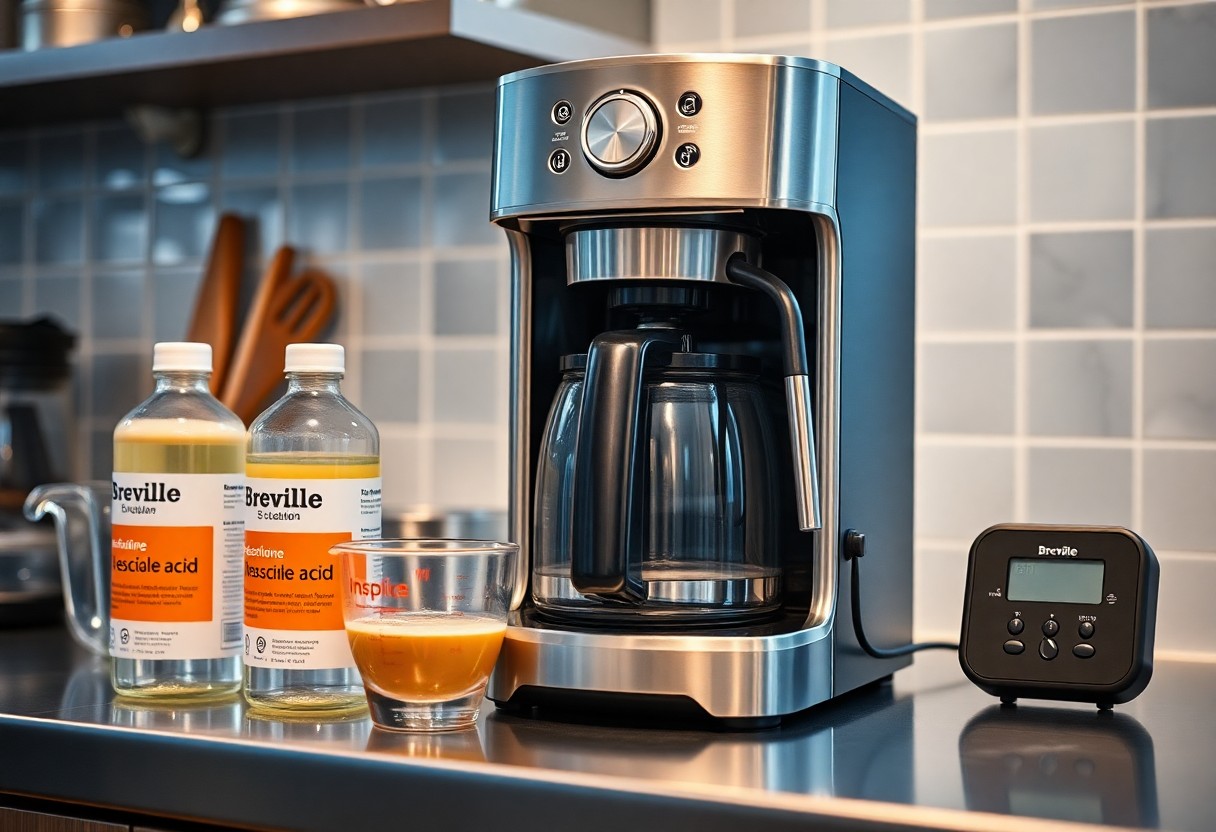
Troubleshooting Descaling Issues
Descaling your Breville coffee machine may sometimes present challenges that require troubleshooting. If your machine isn’t responding correctly during the descaling process, evaluating common issues can help you quickly resume brewing your perfect cup of coffee. Look for error messages displayed on the machine, and ensure you’re using the correct descaling solution as specified in the manual, as some cleaners can be too harsh or not suitable for your model.
Common Problems Encountered During Descaling
When descaling, you might face problems such as the machine not responding to the descaling mode or the solution not draining properly. Other potential issues include residual solution remaining in the system, which can lead to unpleasant tastes in your coffee. It’s important to ensure that all components are properly fitted and that the solution is fresh to avoid these situations.
When to Seek Professional Assistance
Professional assistance may be needed if you encounter persistent issues during the descaling process despite troubleshooting your machine thoroughly. Should problems like frequent error codes or mechanical failures arise, reaching out to a certified technician may prevent further damage and ensure your coffee machine gets back to optimal performance.
If your Breville coffee machine exhibits repetitive error messages that do not disappear after attempting the descaling process multiple times, a professional evaluation is advisable. Similarly, if the descaling solution does not flow through the machine, causing blockages, it could indicate deeper plumbing issues within the machine. Certified technicians have the expertise to diagnose problems accurately and provide repairs that you might not be able to perform on your own, ensuring your coffee ritual remains uninterrupted.
Summing up
Presently, when you seek to descale your Breville coffee machine, it’s important to choose the right products specifically designed for your equipment. Utilizing solutions recommended by Breville not only enhances the longevity of your machine but also ensures optimal coffee flavor. Always refer to the manufacturer guidelines and consider visiting this resource on How to Clean a Coffee Maker 3 Ways to explore additional cleaning methodologies. Your coffee experience will greatly benefit from proper maintenance.
Q: Why is it important to descale my Breville coffee machine?
A: Descaling your Breville coffee machine is crucial to maintaining its performance and longevity. Over time, mineral deposits from water can build up inside the machine, affecting the temperature and flow of water during brewing. This can lead to a decrease in coffee quality and potentially cause damage to the machine. Regular descaling helps ensure your coffee tastes great and that the machine operates efficiently.
Q: What products are recommended for descaling a Breville coffee machine?
A: Breville recommends using their proprietary descaling solution, which is specifically formulated for their machines. It effectively removes mineral buildup without damaging internal components. Alternatively, you can use a mixture of equal parts white vinegar and water, though it may not be as effective in some cases. Always ensure to rinse the machine thoroughly after using vinegar to avoid any residual taste.
Q: How often should I descale my Breville coffee machine?
A: The frequency of descaling can depend on the hardness of your water and how often you use the machine. As a general guideline, it’s recommended to descale your Breville coffee machine every 2–3 months. If you notice a decrease in performance or if you live in an area with hard water, you may need to descale more frequently.
Q: How do I perform the descaling process on my Breville coffee machine?
A: To descale your Breville coffee machine, start by filling the water reservoir with the descaling solution as per the instructions on the product or your homemade mixture. Place a large container under the group head and steam wand to collect the liquid. Activate the descaling program if your model has one, or run the brew cycle and steam function intermittently until the solution is used up. Rinse the reservoir and run fresh water through the machine two to three times to ensure all descaling solution has been removed.
Q: Are there any signs that my Breville coffee machine needs descaling?
A: Yes, several signs indicate that your Breville coffee machine may need descaling. These include a reduction in water flow, longer brewing times, an unusual taste in the coffee, or visible mineral buildup around the water reservoir or steam wand. If you notice any of these issues, it’s a good idea to descale your machine promptly to maintain its performance and coffee quality.

